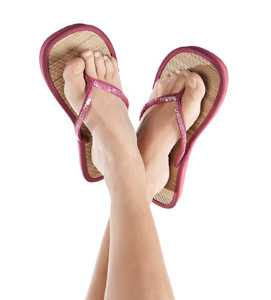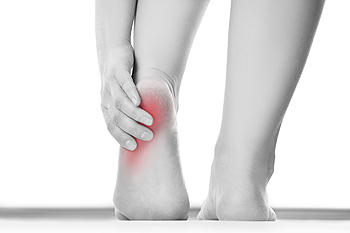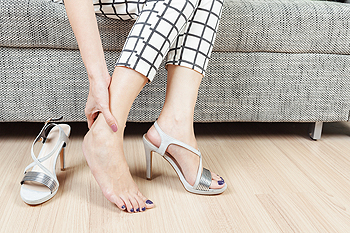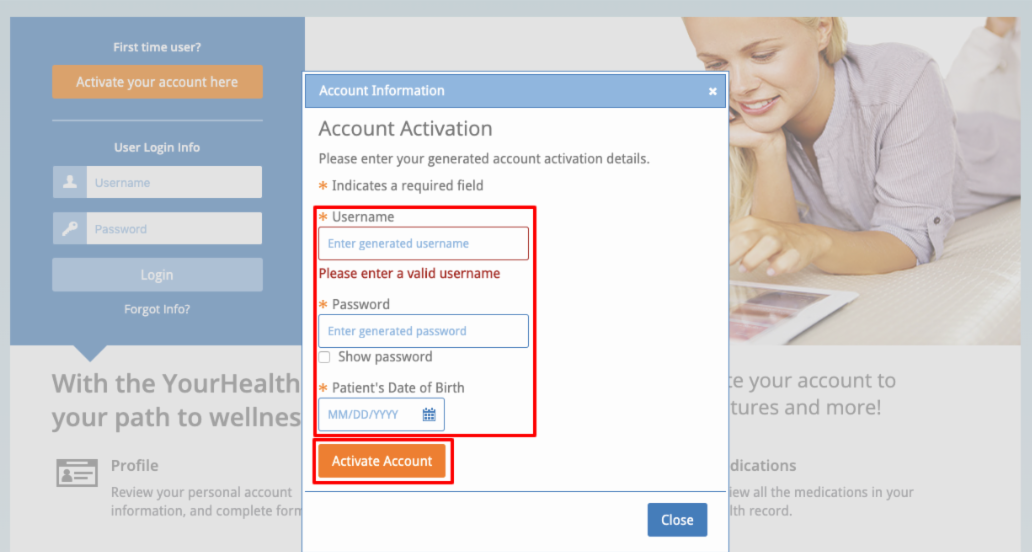Connect With Us
Blog
Items filtered by date: July 2017
Why Flip-Flops Can Be Dangerous for Your Feet
 While flip-flops may be convenient to wear around the pool and locker rooms, they should not be worn for long periods of time. The only benefit that these shoes provide is that they can help protect you from infection, but they tend to do more harm than good for your feet. Typically, flip-flops fail to provide your feet with arch support, which may cause your natural foot arch to collapse. As a result, other parts of your body, such as your hip and back, may be disrupted. Nevertheless, the key to wearing flip-flops is moderation. It is crucial that you only wear these shoes for short periods of time in order to prevent long-term damage to your feet.
While flip-flops may be convenient to wear around the pool and locker rooms, they should not be worn for long periods of time. The only benefit that these shoes provide is that they can help protect you from infection, but they tend to do more harm than good for your feet. Typically, flip-flops fail to provide your feet with arch support, which may cause your natural foot arch to collapse. As a result, other parts of your body, such as your hip and back, may be disrupted. Nevertheless, the key to wearing flip-flops is moderation. It is crucial that you only wear these shoes for short periods of time in order to prevent long-term damage to your feet.
Flip-flops are not always the best choice of footwear. If you have any concerns about your feet or ankles, contact Imaze Marian Davis, DPM from Marian Davis, DPM, PA. Our doctors will assist you with all of your foot and ankle needs.
Flip-Flops and Feet
When the weather starts warming up, people enjoy wearing flip-flops. Flip-flops are comfortable, stylish, and easy to slip on and off; they're perfect for any summer beach goer. However, these shoes can cause harm to the feet.
How Can Flip-Flops Affect Me Long-Term?
- Ankle problems
- Hip problems
- Lower back problems
- Pain in the balls of the feet
- Problems with foot arches
- Changes in the way you walk
Are There Injuries Associated with Flip-Flops?
Yes. Since flip-flops are relatively weak and do not provide the same amount of support as sneakers, people who wear flip-flops regularly are more susceptible to injuries. On top of that, the open nature of the shoe makes your feet more prone to other problems, such as cuts and even infections. Common injuries and ailments include:
- Sprained ankles
- Blisters
- Infections
- Cuts and Scrapes
I like Wearing Flip-Flops. Are There Safe Alternatives?
When buying flip-flops, try to find ones that have sturdy soles and that are made of high-quality materials that will support for your feet. These flip-flops will cost more but will also last longer as a result.
If you have any questions please feel free to contact our office located in Miami, FL . We offer the newest diagnostic and treatment technologies for all your foot and ankle needs.
What Causes Heel Pain?
 Many runners often complain about feeling pain in their heel, and the pain is usually caused by conditions such as plantar fasciitis and Achilles tendonitis. A 2012 study revealed that 1 in 10 people will develop plantar fasciitis in his or her lifetime, and many of these people will belong to the athletic community. If you are suffering from heel pain, it is important that you understand why it is happening so that you know how to treat it. One of the most common causes for heel pain is wearing old, worn-out running shoes. You should always make sure to replace your sneakers after every 500 miles of running. Another cause may be failing to stretch before you work out. It is crucial that you stretch your feet if you want to prevent and relieve any sort of heel pain.
Many runners often complain about feeling pain in their heel, and the pain is usually caused by conditions such as plantar fasciitis and Achilles tendonitis. A 2012 study revealed that 1 in 10 people will develop plantar fasciitis in his or her lifetime, and many of these people will belong to the athletic community. If you are suffering from heel pain, it is important that you understand why it is happening so that you know how to treat it. One of the most common causes for heel pain is wearing old, worn-out running shoes. You should always make sure to replace your sneakers after every 500 miles of running. Another cause may be failing to stretch before you work out. It is crucial that you stretch your feet if you want to prevent and relieve any sort of heel pain.
Many people suffer from bouts of heel pain. For more information, contact Imaze Marian Davis, DPM of Marian Davis, DPM, PA. Our doctors can provide the care you need to keep you pain-free and on your feet.
Causes of Heel Pain
Heel pain is often associated with plantar fasciitis. The plantar fascia is a band of tissues that extends along the bottom of the foot. A rip or tear in this ligament can cause inflammation of the tissue.
Achilles tendonitis is another cause of heel pain. Inflammation of the Achilles tendon will cause pain from fractures and muscle tearing. Lack of flexibility is also another symptom.
Heel spurs are another cause of pain. When the tissues of the plantar fascia undergo a great deal of stress, it can lead to ligament separation from the heel bone, causing heel spurs.
Why Might Heel Pain Occur?
- Wearing ill-fitting shoes
- Wearing non-supportive shoes
- Weight change
- Excessive running
Treatments
Heel pain should be treated as soon as possible for immediate results. Keeping your feet in a stress-free environment will help. If you suffer from Achilles tendonitis or plantar fasciitis, applying ice will reduce the swelling. Stretching before an exercise like running will help the muscles. Using all these tips will help make heel pain a condition of the past.
If you have any questions please contact our office located in Miami, FL . We offer the newest diagnostic and treatment technologies for all your foot and ankle needs.
How Poor Footwear May Cause Injury
 In order to avoid injury, you should be sure to choose the right pair of shoes to wear. Shoes that fit poorly will not only make you uncomfortable, but also give you pain in your feet and aggravate pre-existing conditions. Shoe-lacing techniques have been found to alleviate foot pain, prevent injury, and relieve foot problems. While most people tend to use the criss-cross shoe lacing technique, alternate techniques have been found to prevent heel slippage, bone prominence, and darkening of the toenails.
In order to avoid injury, you should be sure to choose the right pair of shoes to wear. Shoes that fit poorly will not only make you uncomfortable, but also give you pain in your feet and aggravate pre-existing conditions. Shoe-lacing techniques have been found to alleviate foot pain, prevent injury, and relieve foot problems. While most people tend to use the criss-cross shoe lacing technique, alternate techniques have been found to prevent heel slippage, bone prominence, and darkening of the toenails.
Everyday foot care is very important to prevent infection and other foot ailments. If you need your feet checked, contact Imaze Marian Davis, DPM from Marian Davis, DPM, PA. Our doctors can provide the care you need to keep you pain-free and on your feet.
Everyday Foot Care
Often, people take care of their bodies, face and hair more so than they do for their feet. But the feet are a very important aspect of our bodies, and one that we should pay more attention to. Without our feet, we would not be able to perform most daily tasks.
It is best to check your feet regularly to make sure there are no new bruises or cuts that you may not have noticed before. For dry feet, moisturizer can easily be a remedy and can be applied as often as necessary to the affected areas. Wearing shoes that fit well can also help you maintain good foot health, as well as making it easier to walk and do daily activities without the stress or pain of ill-fitting shoes, high heels, or even flip flops. Wearing clean socks with closed shoes is important to ensure that sweat and bacteria do not accumulate within the shoe. Clean socks help to prevent Athlete’s foot, fungi problems, bad odors, and can absorb sweat.
If you have any questions please feel free to contact our office located in Miami, FL . We offer the newest diagnostic and treatment technologies for all your foot and ankle needs.
Why Heels are Bad for Your Feet
 Almost every woman is guilty of owning a pair of high heels. While there are a few pros that come along with wearing heels, the amount of cons outweighs them. One of the common issues with high heels is the pain they cause to those who wear them. The worst pain tends to occur at the ball of the foot, since this is the part that is experiencing the most pressure. Additionally, it is hard for women to find their balance while wearing heels. This can lead to some dangerous injuries while wearing them. Another problem that stems from heels is the fact that they force your toes into an unnatural position. This shifting movement has the potential to cause pain in your toes and calluses.
Almost every woman is guilty of owning a pair of high heels. While there are a few pros that come along with wearing heels, the amount of cons outweighs them. One of the common issues with high heels is the pain they cause to those who wear them. The worst pain tends to occur at the ball of the foot, since this is the part that is experiencing the most pressure. Additionally, it is hard for women to find their balance while wearing heels. This can lead to some dangerous injuries while wearing them. Another problem that stems from heels is the fact that they force your toes into an unnatural position. This shifting movement has the potential to cause pain in your toes and calluses.
High heels have a history of causing foot and ankle problems. If you have any concerns about your feet or ankles, contact Imaze Marian Davis, DPM from Marian Davis, DPM, PA. Our doctors can provide the care you need to keep you pain-free and on your feet.
Effects of High Heels on the Feet
High heels are popular shoes among women because of their many styles and societal appeal. Despite this, high heels can still cause many health problems if worn too frequently.
Which Parts of My Body Will Be Affected by High Heels?
- Ankle Joints
- Achilles Tendon – May shorten and stiffen with prolonged wear
- Balls of the Feet
- Knees – Heels cause the knees to bend constantly, creating stress on them
- Back – They decrease the spine’s ability to absorb shock, which may lead to back pain. The vertebrae of the lower back may compress.
What Kinds of Foot Problems Can Develop from Wearing High Heels?
- Corns
- Calluses
- Hammertoe
- Bunions
- Morton’s Neuroma
- Plantar Fasciitis
How Can I Still Wear High Heels and Maintain Foot Health?
If you want to wear high heeled shoes, make sure that you are not wearing them every day, as this will help prevent long term physical problems. Try wearing thicker heels as opposed to stilettos to distribute weight more evenly across the feet. Always make sure you are wearing the proper shoes for the right occasion, such as sneakers for exercising. If you walk to work, try carrying your heels with you and changing into them once you arrive at work. Adding inserts to your heels can help cushion your feet and absorb shock. Full foot inserts or metatarsal pads are available.
If you have any questions please feel free to contact our office located in Miami, FL . We offer the newest diagnostic and treatment technologies for all your foot and ankle needs.


